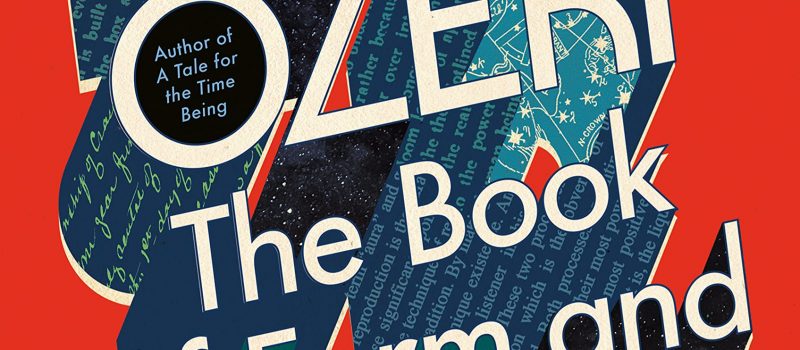Ian Mond Reviews The Book of Form and Emptiness by Ruth Ozeki
 The Book of Form and Emptiness, Ruth Ozeki (Viking 978-0-399-56364-5, $30.00, 560pp, hc) September 2021.
The Book of Form and Emptiness, Ruth Ozeki (Viking 978-0-399-56364-5, $30.00, 560pp, hc) September 2021.
Ruth Ozeki’s new novel The Book of Form and Emptiness tells the story of Benny Oh, a troubled teenager who hears voices, and his mother Annabelle, still recovering from the death of her husband while fighting to keep her small family together. It’s a story narrated to us by a Book. I don’t mean the novel we’re reading, but a self-aware entity consisting of paper, glue, and ink that positions itself as the chronicler of Benny’s tale. The Book is not the sole storyteller. In sections marked by a different font, Benny is allowed to comment on the Book’s depiction of events or cringe when the Book provides too much personal information. “The parts about me are fine, whatever, but the whole world doesn’t need to know about my parent’s sex life.”
The novel (or the Book) begins with the death of Benny’s Japanese father, Kenji. In a darkly humorous, albeit tragic scene, a very stoned Kenji, lying in an alley a few metres from his home, is squashed by a truck transporting chickens. Soon after, Benny starts hearing voices, awoken one night by a moaning sound emanating from a bag filled with Christmas ornaments. Benny, of course, hides the truth from his mother and later his psychiatrist, Dr. Melanie, and it’s only when he stabs himself in the leg with a pair of scissors (they were egging him on to kill his school teacher) that Benny opens up about the voices. He is sent to a pediatric psychiatry ward, where he becomes smitten with an older girl named Aleph. While their initial encounter is fleeting, it’s in the Public Library (the one place where the voices are quiet) where Benny is reacquainted with Aleph. The Library is also where Benny will meet the wheelchair user philosopher, poet, and vodka drinker Slavoj (known to everyone as the Bottleman), where he will learn about the life and work of Walter Benjamin and where, in the dark recesses of the Library’s Bindery, he will confront his very own Book.
It was fascinating to read The Book of Form and Emptiness alongside Richard Powers’s Bewilderment (Reviewed here). They are both novels about a single parent caring for a child dealing with a developmental or mental health issue. Similarly, Ozeki and Powers raise concerns about how quickly we diagnose (or more accurately misdiagnose) and medicate children rather than listen to what they have to say. In terms of tone, though, they take different approaches. While Bewilderment is a work steeped in anger and despair, The Book of Form and Emptiness has a more optimistic outlook. That’s not to say Ozeki’s novel is all rainbows and sunbeams. Like Powers, she is fearful of a certain right-wing American populist, and she never underplays the significant economic challenges Annabelle faces in ensuring Benny receives appropriate care. But the brilliant conceit of the Book, who in voice and demeanour has all the hallmarks of an avuncular, quirky uncle, means the narrative is imbued with a compassion and warmth even during the story’s darkest moments.
There’s another notable difference between Bewilderment and The Book of Form and Emptiness: the latter, unlike the former, is driven by its female characters. Nearly all of Benny’s decisions throughout the novel are motivated by the women in his life, particularly Dr. Melanie, Aleph, and Annabelle. As Benny’s mother, Annabelle rightfully gets most of the air-time. Our first impression of her – mainly through Benny’s eyes – is of a messy hoarder with a penchant for snow globes who infantilises her son. But as we become privy to Annabelle’s thoughts, we are presented with a woman still grieving the loss of her husband – she believes Kenji communicates to her via fridge magnets – who would do anything for her son but recognises she’s unable to help him. And yet, we come to understand that Annabelle is extraordinarily resilient. When her job comes under threat (meaning no health insurance), Annabelle convinces her boss to retrain her; she also bravely stands up to the son of her next-door neighbour, who is seeking to evict her. Of all the memorable characters in the novel, and there are a fair few, it’s Annabelle, who I sympathised with the most.
There’s a great deal packed into The Book of Form and Emptiness – maybe a tad too much. For example, woven through the novel is a subplot about a female Zen Buddhist monk named Aikon who writes an international bestselling self-help book called Tidy Magic that becomes an important (even sacred) text for Annabelle. While Ozeki’s not entirely subtle take on Marie Kondo does provide for some lovely moments of sardonic humour – especially when Aikon heads to Hollywood to make a TV show based on Tidy Magic – there’s something indulgent, even unnecessary, about her appearance in the novel, given that the book is already brimming with distinctive characters. But then, the unruliness of The Book of Form and Emptiness feels very much the point of the novel. As the Book reminds us (and Benny), our lives are essentially disorganised, non-linear, and tangential stories where even those bits that might seem redundant are still a part of who we are. Or, to quote the Bottleman who paraphrases Thomas King: “we are ze stories we tell ourselves, Benny-boy. We meck ourselves up. We meck each other up, too.”
This review and more like it in the September 2021 issue of Locus.
 While you are here, please take a moment to support Locus with a one-time or recurring donation. We rely on reader donations to keep the magazine and site going, and would like to keep the site paywall free, but WE NEED YOUR FINANCIAL SUPPORT to continue quality coverage of the science fiction and fantasy field.
While you are here, please take a moment to support Locus with a one-time or recurring donation. We rely on reader donations to keep the magazine and site going, and would like to keep the site paywall free, but WE NEED YOUR FINANCIAL SUPPORT to continue quality coverage of the science fiction and fantasy field.
©Locus Magazine. Copyrighted material may not be republished without permission of LSFF.








